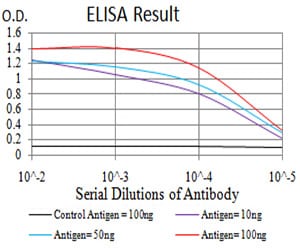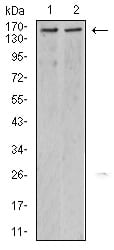

| WB | 咨询技术 | Human,Mouse,Rat |
| IF | 咨询技术 | Human,Mouse,Rat |
| IHC | 咨询技术 | Human,Mouse,Rat |
| ICC | 技术咨询 | Human,Mouse,Rat |
| FCM | 咨询技术 | Human,Mouse,Rat |
| Elisa | 1/10000 | Human,Mouse,Rat |
| Aliases | UTX; KABUK2; bA386N14.2 |
| Entrez GeneID | 7403 |
| clone | 6E2D6 |
| WB Predicted band size | 154kDa |
| Host/Isotype | Mouse IgG2a |
| Antibody Type | Primary antibody |
| Storage | Store at 4°C short term. Aliquot and store at -20°C long term. Avoid freeze/thaw cycles. |
| Species Reactivity | Human,Rat |
| Immunogen | Purified recombinant fragment of human KDM6A (AA: 1252-1401) expressed in E. Coli. |
| Formulation | Purified antibody in PBS with 0.05% sodium azide |
+ +
以下是关于KDM6A抗体的3篇参考文献及其摘要:
---
1. **文献名称**: "KDM6A (UTX) mutations in bladder cancer and their clinical relevance"
**作者**: Aggarwal R, et al.
**摘要**: 该研究通过免疫组化和Western blot分析膀胱癌样本中KDM6A的突变与表达缺失,发现KDM6A功能丧失与肿瘤进展相关,并利用特异性抗体验证其蛋白表达下调与患者预后不良的关系。
---
2. **文献名称**: "UTX/KDM6A suppresses AP-1 and viral reactivation in T-cell acute lymphoblastic leukemia"
**作者**: Van der Meulen J, et al.
**摘要**: 研究使用KDM6A抗体进行ChIP-seq和免疫沉淀实验,揭示KDM6A通过调控H3K27me3水平抑制AP-1信号通路,从而阻止T细胞白血病中致癌基因的异常激活,为靶向治疗提供依据。
---
3. **文献名称**: "KDM6A deficiency activates enhancer regions to drive pancreatic cancer metastasis"
**作者**: Wang L, et al.
**摘要**: 通过CRISPR敲除和KDM6A抗体染色,证实KDM6A缺失导致增强子区域H3K27me3异常去甲基化,激活促转移基因,阐明其在胰腺癌转移中的表观遗传调控机制。
---
**备注**: 如需第4篇或更早期研究,可补充:
4. **文献名称**: "The role of UTX/KDM6A in epigenetic regulation and cancer"(综述)
**作者**: Hong S, et al.
**摘要**: 综述总结KDM6A抗体在染色质免疫共沉淀(ChIP)和临床病理分析中的应用,强调其作为表观遗传治疗靶点的潜力,并汇总突变与多种癌症的关联证据。
---
以上文献均涉及KDM6A抗体的实验应用,涵盖癌症机制与临床关联研究。
The KDM6A antibody targets the KDM6A protein, also known as lysine demethylase 6A or UTX, a member of the KDM6 subfamily of histone demethylases. KDM6A specifically catalyzes the removal of methyl groups from histone H3 lysine 27 (H3K27me2/me3), a repressive chromatin mark, thereby regulating gene expression. This enzyme plays critical roles in embryonic development, cellular differentiation, and tumor suppression by modulating chromatin structure and transcriptional activity. KDM6A is often associated with the COMPASS-like complex and interacts with other epigenetic regulators to maintain cellular identity.
Mutations or deletions in the KDM6A gene are linked to various cancers, including renal cell carcinoma, medulloblastoma, and leukemia, as well as developmental disorders like Kabuki syndrome. Antibodies against KDM6A are essential tools for studying its expression, localization, and functional mechanisms in both normal and disease contexts. They are widely used in techniques such as Western blotting, immunohistochemistry (IHC), chromatin immunoprecipitation (ChIP), and immunofluorescence to explore its role in epigenetic regulation.
Commercially available KDM6A antibodies vary in specificity, with validation often performed using knockout cell lines or tissues to confirm target recognition. Researchers must consider potential cross-reactivity with homologs (e.g., KDM6B/UTY) and verify antibody performance in their experimental systems. These antibodies are pivotal for advancing insights into KDM6A-associated pathways and therapeutic targeting in cancer and genetic disorders.
×